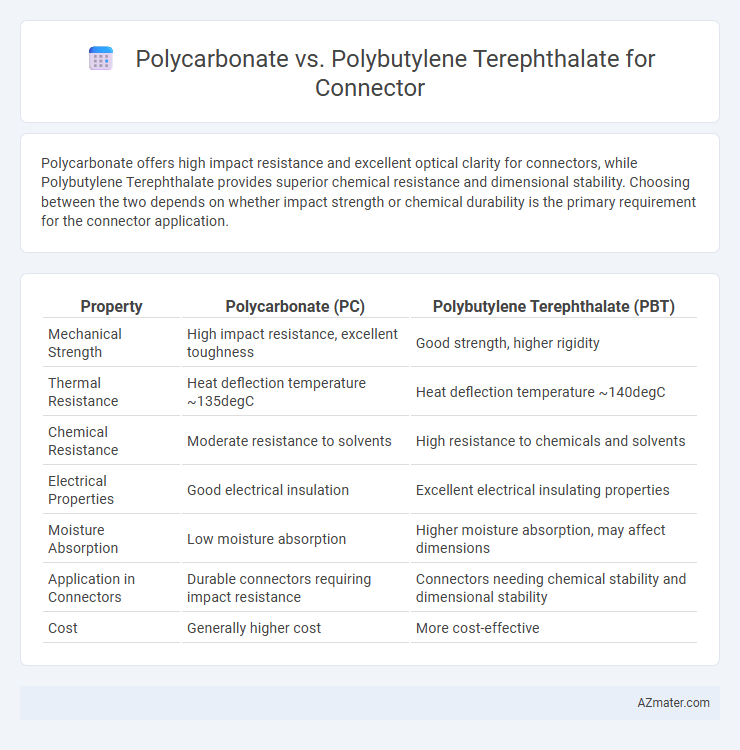Polycarbonate offers high impact resistance and excellent optical clarity for connectors, while Polybutylene Terephthalate provides superior chemical resistance and dimensional stability. Choosing between the two depends on whether impact strength or chemical durability is the primary requirement for the connector application.
Table of Comparison
| Property | Polycarbonate (PC) | Polybutylene Terephthalate (PBT) |
|---|---|---|
| Mechanical Strength | High impact resistance, excellent toughness | Good strength, higher rigidity |
| Thermal Resistance | Heat deflection temperature ~135degC | Heat deflection temperature ~140degC |
| Chemical Resistance | Moderate resistance to solvents | High resistance to chemicals and solvents |
| Electrical Properties | Good electrical insulation | Excellent electrical insulating properties |
| Moisture Absorption | Low moisture absorption | Higher moisture absorption, may affect dimensions |
| Application in Connectors | Durable connectors requiring impact resistance | Connectors needing chemical stability and dimensional stability |
| Cost | Generally higher cost | More cost-effective |
Introduction to Polycarbonate and Polybutylene Terephthalate
Polycarbonate (PC) is a durable, transparent thermoplastic known for its high impact resistance and excellent electrical insulation, making it ideal for connectors requiring mechanical strength and clarity. Polybutylene Terephthalate (PBT) is a semi-crystalline engineering plastic prized for its chemical resistance, dimensional stability, and superior electrical properties under high temperatures. Both materials serve critical roles in connector manufacturing, with PC favored for robust, clear components and PBT chosen for heat-resistant, precise, and chemically stable applications.
Chemical Structure Comparison
Polycarbonate (PC) features a carbonate group (-O-(C=O)-O-) within its backbone, providing high impact resistance and clarity due to its rigid aromatic rings linked by flexible carbonate linkages. Polybutylene Terephthalate (PBT) is a semi-crystalline thermoplastic polyester composed of terephthalate units and butylene glycol segments, resulting in excellent chemical resistance and dimensional stability. The key chemical difference lies in PC's ester-free carbonate linkage offering superior toughness, whereas PBT's ester groups contribute to enhanced crystallinity and chemical durability, influencing their suitability in connector applications.
Mechanical Properties: Strength and Durability
Polycarbonate offers high impact resistance and excellent toughness, making it ideal for connectors requiring superior mechanical strength and durability under dynamic loads. Polybutylene terephthalate (PBT) provides good dimensional stability, chemical resistance, and fatigue resistance, suitable for connectors exposed to thermal cycling and chemical environments. While polycarbonate excels in impact strength, PBT is favored for long-term durability and resistance to environmental stress cracking in connector applications.
Thermal Stability and Heat Resistance
Polycarbonate offers excellent thermal stability with a heat deflection temperature around 130degC, making it suitable for connectors exposed to moderate heat. Polybutylene terephthalate (PBT) exhibits superior heat resistance, maintaining mechanical properties at temperatures up to 150degC and providing better long-term thermal performance. Connectors requiring higher thermal endurance and resistance to thermal aging benefit more from PBT due to its enhanced heat deflection and lower thermal expansion.
Electrical Insulation Capabilities
Polycarbonate offers excellent electrical insulation properties with a high dielectric strength around 16-18 kV/mm, making it suitable for connectors in medium to high voltage applications. Polybutylene Terephthalate (PBT) provides superior electrical resistance and low moisture absorption, maintaining stable insulation performance under humid or harsh environmental conditions. PBT's combination of thermal stability and electrical insulation makes it preferable for connectors requiring long-term durability and reliable performance in automotive and industrial electronics.
Resistance to Chemicals and Environmental Factors
Polycarbonate exhibits excellent resistance to impact and moderate chemical exposure but tends to degrade when exposed to strong acids, bases, and prolonged UV radiation, making it less ideal for harsh environments. Polybutylene Terephthalate (PBT) offers superior chemical resistance to hydrocarbons, alcohols, and dilute acids, alongside greater stability against moisture and UV exposure, enhancing connector durability in demanding conditions. Selecting PBT for connectors ensures longer lifecycle performance in chemically aggressive or environmentally challenging applications compared to polycarbonate.
Processability and Manufacturing Considerations
Polycarbonate offers excellent processability for connectors due to its high impact resistance and dimensional stability, enabling precise molding with minimal shrinkage and fast cycle times in injection molding. Polybutylene terephthalate provides superior chemical resistance and enhanced thermal stability, making it suitable for connectors exposed to harsh environments, but may require more controlled processing conditions such as higher mold temperatures and slower cooling rates to prevent warpage. Manufacturing considerations highlight that polycarbonate's ease of processing supports high-volume production, while polybutylene terephthalate demands optimized parameters to balance mechanical properties and surface finish quality.
Cost Analysis: Polycarbonate vs Polybutylene Terephthalate
Polycarbonate connectors generally have a higher material cost compared to polybutylene terephthalate (PBT) due to their superior impact resistance and transparency properties. PBT offers a cost-effective alternative with good mechanical strength and chemical resistance, making it favorable for budget-conscious applications. Manufacturing costs for PBT are typically lower owing to its easier moldability and faster cycle times in injection molding processes.
Common Applications in Connector Manufacturing
Polycarbonate (PC) is widely used in connector manufacturing for applications requiring high impact resistance, excellent optical clarity, and dimensional stability, such as in automotive connectors and consumer electronics. Polybutylene Terephthalate (PBT) is favored for connectors that demand superior chemical resistance, electrical insulation, and low moisture absorption, making it ideal for industrial equipment and telecommunications connectors. Both materials are critical in connector production, with PC preferred for durability and visibility, while PBT is selected for thermal stability and electrical performance in demanding environments.
Conclusion: Choosing the Right Material for Connectors
Polycarbonate offers superior impact resistance and transparency, making it ideal for connectors requiring durability and visual inspection. Polybutylene Terephthalate provides excellent chemical resistance and dimensional stability, suitable for harsh environments and precise applications. Selecting the right material depends on balancing mechanical strength, environmental exposure, and cost-efficiency to enhance connector performance and longevity.

Infographic: Polycarbonate vs Polybutylene Terephthalate for Connector
 azmater.com
azmater.com